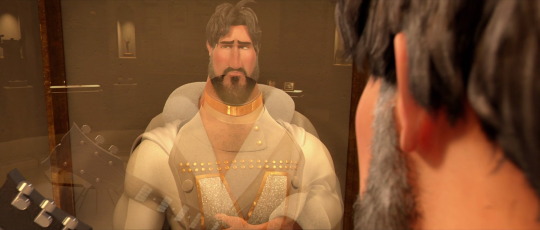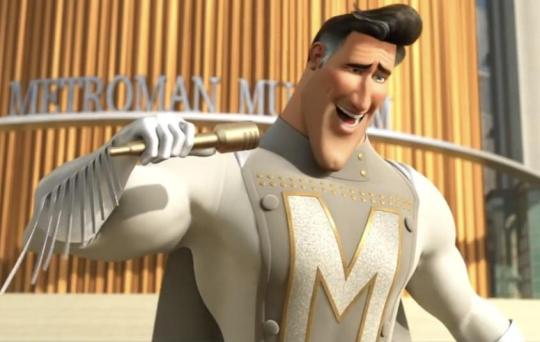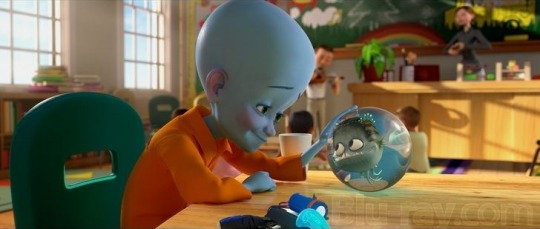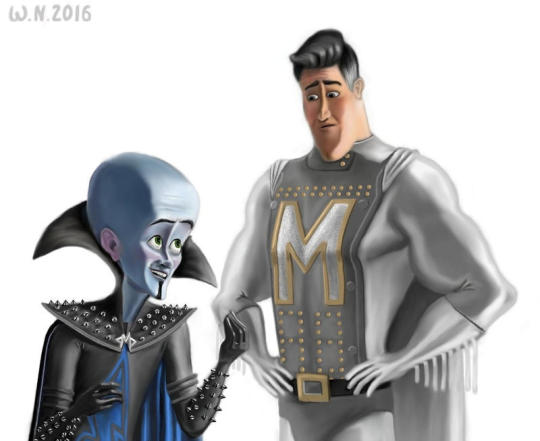#when the truth is that it's fandom ADULTS who are responsible for all the infrastructure fandom relies on
Explore tagged Tumblr posts
Text
I unironically hope that my hubby and I are still cosplaying together in our 60s.
Fandom elders are so precious and important.

sweetest post ever??? 😭
#when the truth is that it's fandom ADULTS who are responsible for all the infrastructure fandom relies on#teenagers don't found cons#teenagers aren't fueling the fandom economy#adults are#and always have been
35K notes
·
View notes
Text
FAN THEORY THURSDAY – Why Did Metroman Retire?

Happy Almost-Friday, everyone! And even though Minion threatens to smother everything he cooks in old Limburger cheese each time I say it: SPOILER WARNING!
Yes, I know, it’s three a.m. and it’s technically Friday, but I’m still calling this Thursday night, and there’s nothing you can do about it.
Okay, let’s be honest, Metroman is a character who seems, on the surface, to require little explanation in the film Megamind. He’s only present in the beginning and end, and we spend half the movie believing he’s dead, and we learn that Metroman has done something almost unheard of among superheroes: he’s chosen to retire. The question is: why? There is a tendency to think that he's simply a spoiled rich boy who, (in his social life, at least,) does what he wants without regard for others, but is that really fair? Or could there be other possible reasons? Well, let’s take a look at a few fan theories that may explain why he chose to abandon heroism for a music career.
Metroman Didn’t Want to Be a Hero
Although he’s clearly based on—and perhaps even poking a little fun at—the Man of Steel, Metroman was no Superman. (I mean, okay, he was technically a super-man, since he had strength, speed, and powers far beyond what a human would possess.) Except, here’s the thing: he’s not a carbon copy of the Man of Steel; Metroman and Superman have completely different lives and personalities. This remains true despite the fact that they share a similar origin—that of being aliens from a dead planet—and identical powers—including laser-vision and flight. Even their code names are comparable. However, if we look deeper, it becomes obvious that Metroman and Superman are two very different characters.

Superman is all about being an upstanding hero. Although he can be annoyingly persnickety, and sometimes displays nearly oppressively unyielding strictures about right and wrong, one thing you can say about the Man of Steel is that he’s generally integral. He is exactly what his public image portrays him to be: a Good Guy through and through. The same isn’t true of Metroman, and in some ways that makes him a more complex and interesting character.
The childhoods of the two heroes are extremely different. As I’ve mentioned in Why Was Megamind Raised in Prison, when a boy, Metroman was a bully, not only making young Megamind an outsider and the object of everything from teasing to physical attacks, but also inspiring other students to do the same. Superman, on the other hand, far from being a bully was bullied by Pete Ross. Rather than using his powers against others, he was too responsible and good-hearted to use them even against Pete Ross. Metroman is adopted by super-wealthy parents, and is essentially a trust-fund baby, while Superman was adopted by a farm family. He grows up with a good work ethic and hometown values. Indeed, this economic discrepancy continues into adulthood. As far as we can tell, Metroman doesn’t need to work and has no job outside being a superhero. Superman, conversely, has to earn a living as a journalist. Finally, in the majority of comics, Superman avoids most public appearances, unless he feels they serve some beneficial social purpose. Indeed, he goes to great lengths to keep his identity a secret and avoid the public eye as much as possible. The first time we see Metroman in the film, however, he is basking in a crowd’s adoration at the dedication of a museum in his honor. Indeed, in the original script, then called Mastermind, Metroman’s real identity seems to be widely known. (In case you’re wondering, this is where the name Wayne Smith, commonly used in the fandom, originates from.) So, we see that these character are actually very different: one is a hero strictly for the greater good, and the other, while he certainly does a lot of good things, is also in it for the fame.

This may seem like I’m being harsh toward poor Wayne Smith, but his flaws do not, in fact, make him a bad person. The issue is that we’re comparing him to Superman who, while still certainly imperfect, is intended to be a better-than-average person in every way, including moral. Make no mistake, Metro City’s former hero isn’t any sort of villain; what he is is normal. If we’re honest, most of us would be pleased by wide-spread accolades and honors. He reacts to positive fame the same way nearly anyone would because, at his heart, he’s really just a typical guy. That is the material point: Wayne Smith really only wants to be an average citizen—a music star, perhaps, but still a relatively ordinary person. In that way, he and Megamind are alike: they both desire, more than nearly anything else, to be normal. The key difference is that Megamind’s sincere and driving concern for his city also makes him ideal for becoming a hero. (You can learn more about this particular fan theory in The Warden and in Megamind and Identity.)
So, why did Wayne Smith become a Defender in the first place, then? Again, I’ve briefly touched on this in previous posts, but it appears likely that Metroman was pushed into heroism just as much as Megamind was pushed into supervillainy. Because he was a bully with superpowers, it’s likely that adults around him realized something had to be done about Wayne. Otherwise he was a danger. So, they constructed an environment—the Li’l Gifted School—where he could be conditioned to seek the praise of others as well as to fight Megamind, who had been singled out as his future nemesis. (In fact, that conditioning is probably why he opted for a career that would put him on stage, aside from a probable love of music.)

Because the path chosen for Megamind involved more hardships and pain, it’s easy to forget that Metroman was in essentially the exact same plight. However, the fact remains that these were both children, and they were both being coerced into perceived destinies they didn’t want. Neither of them were given a choice and, in the end, both of them cast off the expectations pressed upon them to become the people they really wanted to be. The difference is that, because of our natural biases, Megamind’s rise to Defender of Metro City seems more noteworthy than Metroman’s step into Mr. Average Joe. The truth, however, is that both characters were basically doing the same thing: being true to themselves.
Metroman May Have Had Health Concerns
We know Megamind and Metroman are close to the same age—although the latter appears to be about a year rather than days old when he lands on Earth—but what that age is is open to supposition. We know, however, that they are almost certainly in their thirties, probably in their mid- to late-thirties. (Take a look at How Old is Megamind for more information about that.) However, we can see that Wayne is already going gray around the temples. Of course, some people’s genetics simply cause them to go gray earlier, and that’s certainly a possibility, but one fan theory suggest there may be more going on. The idea has been put forward that Wayne’s super-speed may be having an adverse effect on him, forcing his body to work overtime to keep up. The resulting physical stress could be making him age prematurely.
That’s not the only factor to consider. As hard as heroism may have been on his body, the effects on Metroman’s mind would have been even greater. Before the events in the movie, Metro City’s authorities—and, indeed, all its citizens—became too reliant upon their superhuman hero, and as a result that hero was run ragged. That isn’t a mere hypothesis. A scene that was storyboarded but never included in the final film makes Metroman’s plight perfectly clear. We see him being called from one end of the city to the other for everything from a massive explosion to an old lady needing help opening a jar. Keep in mind that, when hearing a cry for assistance, the hero would likely be unable to tell who truly needed him urgently and who was simply making unnecessary demands, thus he would have to rush to every call he heard. Even the city’s law enforcement seems to take him for granted, refusing to take criminals he just hand-delivered to jail because they’re on lunch break. The cumulative effect is that Metroman looks nearly frantic with stress.
youtube
This is important because, aside from the obvious mental and emotional concerns, this sort of stress accelerates aging as well. According to an article in the Huffington Post, when glycation and telomere shortening, as well as the over-oxidation, are caused by enduring heightened stress for prolonged periods of time, it can result not only in graying hair and premature wrinkles, but heart trouble as well. Even the memory can be affected, as one study by the University of Wisconsin found that stress can age a person’s brain up to four years faster than normal, and contribute to cognitive problems later in life. (The study was part of a presentation—you have no idea how badly I wanted to write that word in all-caps—and is thus currently unpublished, but information about it can be found in an article from Over Sixty.)
Metroman Retired for the Good of Everybody
As you can see, in a strange way, having a super-powered Defender was actually crippling Metro City. In fact, it may be truly damaging to the local infrastructure and official organizations. Youtuber Olaf Scholtens, in his video Megamind: Power and Identity, uses the metaphor of an airplane manufacturer to explain what’s going on. (If you’ve read my own post Megamind and Identity, you’ve seen this before.) Engineers and factories put a lot of effort and expense into making certain aircraft are as safe as possible, but what would happen if they felt they could confidently assume a superhero would simply catch any plane that crashed, saving everyone on board? Safety standards would probably become far more lax, and people might be in far more danger as a result. Given the way that nearly everyone in Metro City seems to assume Metroman will always save the day, it’s possible that, within the urban area, the same thing could be happening with things like building code enforcement, large construction projects, and even public safety measures. Bridges might not be properly built, fire hazards might not be addressed, and, given the blasé attitudes of the cops in the storyboard, law enforcement officers might not even be bothering to keep an eye on things. By retiring, Metroman forced the city to become more self-sufficient again.
That, however, may not have been the only problem Metroman was trying to solve. Remember the whole discussion about the former Defender’s school boy bullying and the apparent conspiracy to turn one boy into a hero and the other into a supervillain? It’s possible Wayne may have felt remorse for the former and found out about the latter. Having battled Megamind so much in the past, he also may have realized that the blue man never actually hurt anyone, and in fact went out of his way to stage their confrontations in abandoned places. (Again, you can read more about that in both Megamind and Identity and The Warden.) It may be that Metroman real “brilliant plan” wasn’t simply to fake his death, but in doing so to prod Megamind into becoming a hero and thus accepted by society.

There is an alternative theory, put forward in a Reddit post, that Megamind and Metroman’s parents may have known one another, and may have sent both children to Earth with the intention of them becoming a dynamic duo, fighting evil together with Megamind as the brains and Metroman as the brawn. This could have been what Megamind’s father meant when he told his son: “You are destined for greatness.” While there is very little support for this in the movie, it would explain why, in the vast cosmos, both of the young survivors were sent not only to the same planet, but even to the same city.
Whatever the reason may have been, one thing is certain: there certainly is some evidence that Metroman intended his one-time nemesis to become a hero. One of his lines, after Roxanne and Megamind discover he’s still alive, supports this. You know the one. “If there’s bad, good will rise up against it. It’s taken me a long time to find my calling; now it’s time you find yours.” Then, of course, there is another line, when Music Man is watching his former enemy take the role of Defender of Metro City: “way to go, Little Buddy. I knew you had it in you.”
If Metroman really did purposefully help Megamind step into heroism, that could also explain why he didn’t stop Megamind from taking over the city—perhaps he trusted the blue man not to harm anyone and to eventually come to his senses—as well as why he refuses to overtly help defeat Titan. He does, however, clearly subtly assist Megamind, as the latter almost certainly went back to Wayne’s hideout to scan his appearance and voice into the holowatch. All of this together makes it seem quite plausible that Metroman not only wanted to retire, but also wanted the blue man to take his place.

Megamind and Metroman by White-Night-56 on Deviant Art
Maybe this means that, now that Megamind is the Defender of Metro City, he and Music Man occasionally get together to commiserate over the more difficult aspects of being a superhero and joke about the old days.
It’s also quite possible that all of these fan theories could be true. The film Megamind is, among other things, surprisingly subtle, complex, and subversive for an animated movie. Every time I dive deep into some aspect or other of the plot, I am once again impressed by the amount of thought and detail that went into this work. No wonder Megamind—and its characters—have so many dedicated fans.
#Megamind#Megamind movie#Metro Man#Metroman#Wayne Smith#Megamind fan theory#Megamind fan theories#DreamWorks#hero#Defender#Metro City#fan theory#fan theories#Fan Theory Thursday#Megamind fandom#Youtube#megamind
52 notes
·
View notes